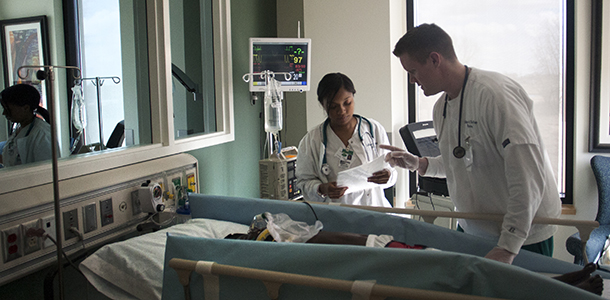
Students train on a human patient simulator (Photo Credit: COD Newsroom/Flickr)
Across California, nurses are upgrading their skills to respond to a shortage of qualified health care workers with specialty training.
Three specialty trainings designed to meet industry demands are being offered through the Health Workforce Initiative (HWI), a program of the Workforce and Economic Development division of the California Community Colleges Chancellor's Office.
All three programs were developed to increase the availability of training for specialty registered nurses in areas such as emergency department, critical care, perioperative, ambulatory care, labor and delivery.
The Hospital Association of Southern California (HASC) demonstrated the workforce need with surveys showing the hiring demand outpacing the availability of qualified nurses. Across specialties, the HASC data shows a need for more than 6,000 newly qualified nurses in Southern California alone.
“The Health Workforce Initiative strives to be responsive to workforce needs,” said Linda L. Zorn, statewide director and sector navigator for the Health Workforce Initiative. “We have embraced this request for specialty RN training and are making strides toward providing programs that respond.”
In Orange County, for example, HWI offers a nine-week Critical Care Specialty Nursing Program in collaboration with Golden West College and local area hospitals. The course teaches those who provide care for some of California’s sickest patients with a “high-fidelity” human patient simulator. In the last two years, more than 110 students – either new registered nurses or incumbent nurses – have completed the classroom portion of this program at Golden West College and then experienced the hands-on and simulator sections at partner hospitals.
As a learning technique, human simulators are growing in popularity due in part to the fact that they replicate the clinical environment and allow for experiential training of clinical and decision-making skills. The students, sometimes called intensive care unit or ICU nurses, require specialty training to care for patients who are critically ill and at high risk for life-threatening health problems.
The complexity of this care requires specialized training and the human patient simulator allows for a safe space in which to learn and practice vital critical care skills. An instructor controls the simulator and its physiological responses to student interventions.
In Northern California, more than 1,000 nurses have benefited from a series of specialty nursing certification review courses developed by Butte College HWI in partnership with Enloe Medical Center in Chico and the Northern Rural Training Employment Consortium, which is the local workforce investment board.
“Once again, California Community Colleges are able to provide students (and in this case the students are incumbent workers) the necessary training to advance into higher paying nursing positions,” said Zorn.
Enloe Medical Center identified the need for several areas of nurse specialty training and their staff developed the programs in collaboration with the Butte College HWI. The courses cover a variety of specialties including medical-surgical, critical care, emergency, inpatient obstetrics, orthopaedic, stroke care, trauma care after resuscitation, nurse manager and leader, pediatric, and maternal/low-risk newborn care. HWI further supports the trainings by covering the cost of the course speakers and event marketing while Enloe Medical Center facilitates registration and continuing education credits and provides the venue.
In response to San Diego’s shortage of certified ambulatory care nurses, Ann Durham, the Health Workforce Initiative deputy sector navigator for the San Diego/Imperial Region developed a third program. She collaborated with industry partner Lisa Duncan, BSN, MBA, RN-C, CIC, to create and deliver an Ambulatory Care Nurse Certification Review Course.
Attendees of the eight-hour class earn continuing education credits as required by their licensing agency. Upon completion, they are prepared to sit for the certification exam required to work as an ambulatory care nurse. First offered in June 2016, the class included students from Kaiser Permanente, UC San Diego, Scripps, and Family Health Centers of San Diego, at least one of whom has since successfully earned her certification.
Funding from the California Community Colleges' Doing What Matters initiative makes it possible for new and incumbent nurses to learn needed skills, become eligible for potential pay raises, and possibly work in the specialty area they’ve studied. All of these customized courses advance the qualifications of California’s health care workforce, while meeting the state’s growing needs for specialized care.

